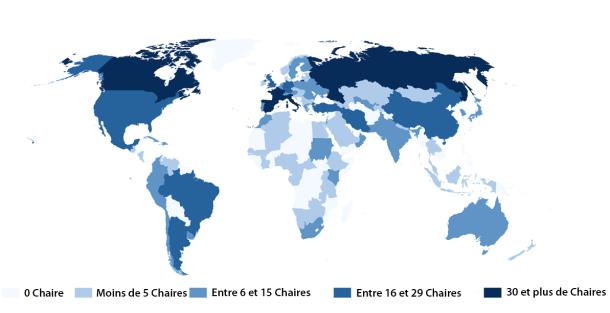
What you need to know about UNESCO Chairs and UNITWIN Networks
What are UNESCO Chairs and UNITWIN Networks?
A UNESCO Chair is a team led by a higher education or research institution that partners with UNESCO on a project to advance knowledge and practice in an area of common priority. There are currently some 950 UNESCO Chairs.
A UNITWIN Network is a partnership between UNESCO and a network of higher education or research institutions of at least three institutions in different countries, at least two of which must be located in the Global South, and which pool their competencies and resources around particular theme(s). There are currently some 45 UNITWIN Networks.
The UNITWIN/UNESCO Chairs Programme mobilizes expertise of higher education and research institutions to address the interdependent challenges of today’s increasingly complex world. It was established in 1992 with the vision to advance an integrated system of research, training and activities in diverse fields by building university networks and encouraging inter-university cooperation through the transfer of knowledge and expertise across borders.
What do the UNITWIN/UNESCO Chairs do and how do they support UNESCO’s work?
The UNESCO Chairs and UNITWIN Networks contribute to strengthening higher education systems and fostering collaborative research partnerships and networks. Through its integrated approach that combines research, teaching and training, as well as community engagement, the Programme has proven value in advancing UNESCO’s interdisciplinary knowledge generation and the Organization’s role as global observatory and as a laboratory of ideas. It has established new teaching programmes, generated novel ideas through research and dialogue, and contributed to the enrichment of existing higher education partnerships and networks. Mostly, it has inspired generations of students and researchers to align their work with UNESCO in support of the ideals of the Organization.
As the world faces a broad set of emerging technological, social, political, and environmental disruptions, the UNITWIN Programme is needed more than ever to advance the mission of UNESCO and its intellectual role within the United Nations, to contribute towards sustainable development. UNESCO Chairs and UNITWIN Networks act as think tanks and bridge-builders between the academic world, civil society, local communities, research and policy-making thereby strengthening UNESCO’s research-training-policy-society nexus. The activities and projects undertaken by UNESCO Chairs and UNITWIN Networks aspire to foster public intellectual debate, ethical reflections, standard setting, research and scientific progress, open knowledge and information, and education in a spirit of international cooperation.
How many people are engaged through the UNESCO Chairs and UNITWIN Networks?
Today, there are some 950 UNESCO Chairs and 45 UNITWIN Networks hosted in higher education institutions in 120 countries. Each Chair or Network is lead prominent academics in their field of competence and supported by a team within the same university but also with diverse partners, often in different regions of the world. This makes some 10,000 individuals involved in the UNESCO Chairs programme.
While more than 50% of the members are from universities in Europe and North America, efforts are underway to encourage more applications and partnerships in other regions of the world.

What have been the recent changes to the Programme?
During the course of 2022, the Programme made several reforms:
- Digitizing the process of application and evaluation, so streamline administrative processes;
- Revising the criteria for evaluation of proposals so that Chairs/Networks to ensure better contribution to UNESCO priorities and programme;
- Building foundation for stronger engagement with and among network members, in particular through:
- 30th Anniversary celebration, which was a chance to reflect on progress, as well as exchange on collective approaches for the coming years.
- The launch of the UNESCO Chairs Seminars
- The launch of an established UNESCO Chairs LinkedIn page
How can I get involved?
UNESCO Chairs or UNITWIN Networks may only be established at higher education and research institutions that are recognized, accredited or otherwise sanctioned by the competent national or local authority. UNESCO also welcomes applications from UN Member States, even if they are not UNESCO Member States at the time of application.
However, other types of institutions can partner with a UNESCO Chair or UNITWIN Network. These include NGOs and foundations, other academic associations, inter-university and academic networks that wish to link their activities with the UNITWIN Programme, as well as country, regional and international public or private institutions and agencies that currently cooperate with UNESCO or plan to do so in an area of intellectual cooperation.
Consult the The UNITWIN/UNESCO Chairs Programme: guidelines and procedures for more information.

